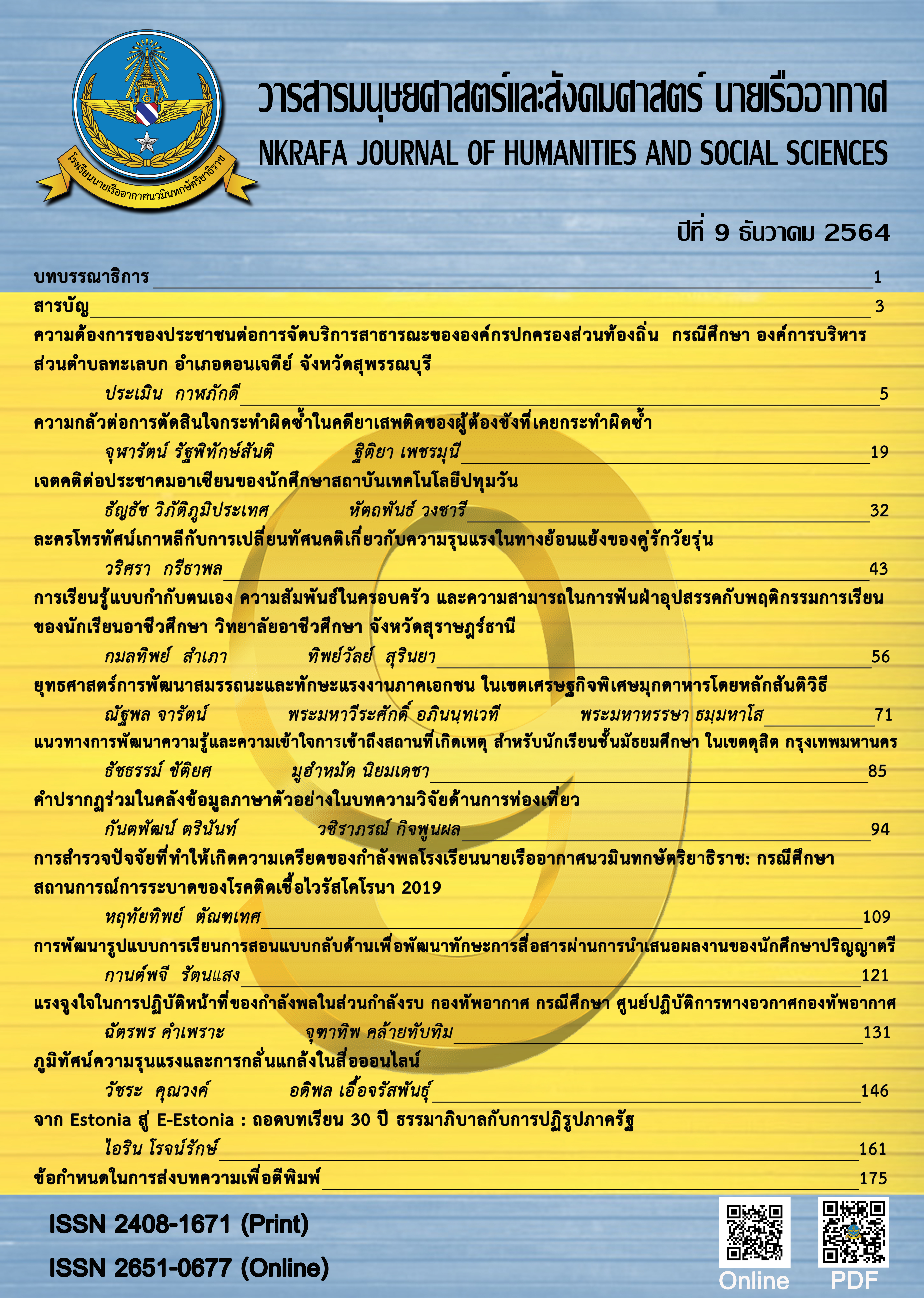Lexical Collocations in a Sample Corpus of Tourism Research Articles (SCTRA)
Main Article Content
Abstract
This corpus-based study was conducted in an attempt to facilitate the teaching and learning of English for Specific Purposes (ESP) and benefit Thais who work in the field of tourism by exploring lexical collocations in Tourism Research Articles. A Sample Corpus of Tourism Research Articles (SCTRA), with a corpus size of over 1.5 million running words, was compiled from 240 research articles from six journals in the field of tourism and hospitality management. Nine hundred and thirty-two keywords were obtained under the set criteria using the AntConc version 3.5.8. The majority of the keywords were nouns (62.72%), followed by adjectives (18.37%), verbs (16.37%), and adverbs (2.53%) respectively. The keywords were then used as “nodes” to find their “collocates” which generated 2,989 pairs of lexical collocations with 16 combination types, where six combination types were in accordance with the set framework adapted from Benson, Benson and Ilson [1]. The majority of them were Noun + Noun (44.76%), Adjective + Noun (25.89%), and Noun + Verb (9.33%) respectively. The lists of the keywords and the collocations produced were also provided.
Article Details
บทความที่ได้รับการตีพิมพ์เป็นลิขสิทธิ์ของวารสารมนุษยศาสตร์และสังคมศาสตร์ นายเรืออากาศ
ข้อความที่ปรากฎในบทความแต่ละเรื่องในวารสารวิชาการเล่มนี้ เป็นความคิดเห็นส่วนตัวของผู้เขียนแต่ละท่าน ไม่เกี่ยวข้องกับโรงเรียนนายเรืออากาศฯ และคณาจารย์ท่านอื่น ๆในโรงเรียนนายเรืออากาศฯ แต่อย่างใด ความรับผิดชอบขององค์ประกอบทั้งหมดของบทความแต่ละเรื่องเป็นของผู้เขียนแต่ละท่าน หากมีความผิดพลาดใด ๆ ผู้เขียนแต่ละท่านจะรับผิดชอบบทความของตนเองแต่เพียงผู้เดียว
References
M. Benson, E. Benson, and R. Ilson, The BBI Combinatory Dictionary of English: Your Guide to Collocations and Grammar (3rd ed.), John Benjamins, Amsterdam, The Netherlands, 2010.
W. Chulaphan, and J. F. Barahona, “Contribution of Disaggregated Tourism on Thailand’s Economic Growth,” Kasetsart Journal of Social Sciences, 39(3), pp. 401-406, 2018. Available: https://www.sciencedirect.com/science/article/pii/S2452315116301898
J. Hill, “Revising Priorities: From Grammatical Failure to Collocational Success,” in M. Lewis (Ed.), Teaching Collocation: Further Developments in the Lexical Approach (pp. 47-69), Language Teaching Publications, London, UK, 2000.
P. Farrokh, “Raising Awareness of Collocation in ESL/EFL Classrooms,” Journal of Studies in Education, 2(3), pp. 55-74, 2012.
M. Martin, “Advanced Vocabulary Teaching: The Problem of Synonyms,” Modern Language Journal, 68(2), pp. 130-137, 1984.
W. Cheng, Exploring Corpus Linguistics: Language in Action, Routledge, London, UK, 2012.
M. Lewis, Implementing the Lexical Approach: Putting Theory into Practice, Heinle, Thomson Corporation, London, UK, 2002.
N. Schmitt, Vocabulary in Language Teaching. Cambridge University Press, Cambridge, UK, 2000.
J. Bahns, “Lexical Collocations: A Contrastive View,” ELT Journal, 47(1), pp. 56-63, 1993.
K. Ackermann, and Y. H. Chen, “Developing the Academic Collocation List (ACL) – A Corpus-driven and Expert-judged Approach”. Journal of English for Academic Purposes, 12(4), pp. 235-247, 2013.
A. Molavi, M. Koosha, and H. Hosseini, “A Comparative Corpus–based Analysis of Lexical Collocations Used in EFL Textbooks,” Latin American Journal of Content and Language Integrated Learning, 7(1), pp. 66-81, 2014. Available: doi:10.5294/laclil.2014.7.1.4 eISSN 2322-9721.
M. Borucinsky, and J. Kegalj, “Collocations in Marine Engineering English,” Scripta Manent, 10(2), pp. 36-51, 2015.
C. Demir, “Lexical Collocations in English: A Comparative Study of Native and Non-native Scholars of English,” Journal of Language and Linguistic Studies, 13(1), pp. 75-87, 2017.
S. Thongvitit, and N. Thumawongsa, “A Corpus-Based Study of English Collocations Found in the Abstracts of Research Articles Written by Thai EFL Writers,” International Journal of Social Science and Humanity, 7(12), pp. 751- 755, 2017.
K. Trinant, and B. Yodkamlue, “Lexical Collocations in a Sample Corpus of Nursing Research Articles (SCNRA),” Suranaree Journal of Social Science, 13(1), pp. 45-72, 2019.
L. Anthony, AntConc (Version 3.4.4) [Computer Software]. Tokyo, Japan: Waseda University, 2019. Available: http://www.laurenceanthony.net/.
P. Baker, Using corpora in discourse analysis, Continuum, London, UK, 2006.
A. Coxhead, “A New Academic Word List,” TESOL Quarterly, 34(2), pp. 213-238, 2000.
J. Ward, “A Basic Engineering English Word List for Less Proficient Foundation Engineering Undergraduates,” English for Specific Purposes, 28, pp. 170-182, 2009.
M. N. Yang, “A Nursing Academic Word List,” English for Specific Purposes, 37, pp. 27-38, 2015.


